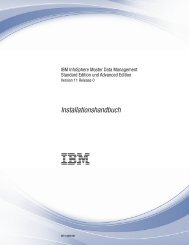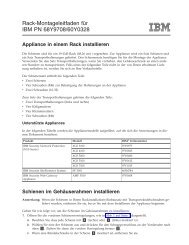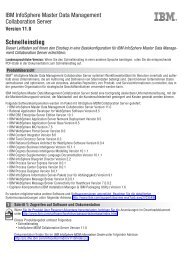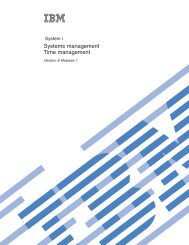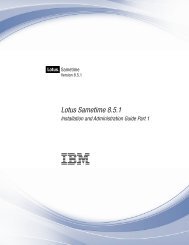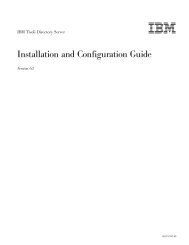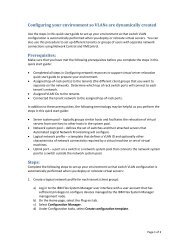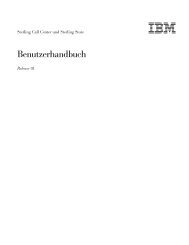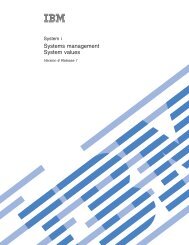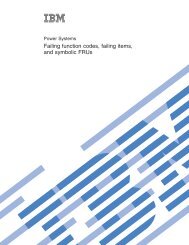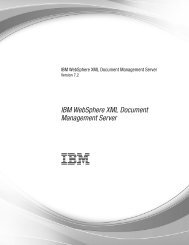System i: Programming Secure Sockets APIs - IBM
System i: Programming Secure Sockets APIs - IBM
System i: Programming Secure Sockets APIs - IBM
Create successful ePaper yourself
Turn your PDF publications into a flip-book with our unique Google optimized e-Paper software.
Error Messages<br />
Message ID Error Message Text<br />
CPE3418 E Possible APAR condition or hardware failure.<br />
CPF9872 E Program or service program &1 in library &2 ended. Reason code &3.<br />
CPFA081 E Unable to set return value or error code.<br />
Usage Notes<br />
1. The gsk_secure_soc_startInit() function is valid only on sockets that have an address family of<br />
AF_INET or AF_INET6 and a socket type of SOCK_STREAM.<br />
2. The current implemention of the SSL Protocol does not allow gsk_secure_soc_startInit() to complete<br />
synchronously. Use gsk_secure_soc_init() if the synchronous behaviour is needed.<br />
3. When doing the SSL handshake with a GSK_SESSION_TYPE value of GSK_SERVER_SESSION or<br />
GSK_SERVER_SESSION_WITH_CL_AUTH, the GSK_CONNECT_CIPHER_SPEC value will be the first<br />
cipher found in the ordered GSK_V3_CIPHER_SPECS( GSK_V2_CIPHER_SPECS if SSLV2 is only<br />
common protocol) list that was also found in the cipher list provided by the client during the SSL<br />
handshake.<br />
4. When doing the SSL handshake with a GSK_SESSION_TYPE value of GSK_CLIENT_SESSION, the<br />
cipher specification list will be sent to the server in the client hello in the order found in the<br />
GSK_V3_CIPHER_SPECS and/or GSK_V2_CIPHER_SPECS list, however the value from that list that<br />
is negotiated for GSK_CONNECT_CIPHER_SPEC is determined by the server policy.<br />
Related Information<br />
v “gsk_secure_soc_close()—Close a secure session” on page 37—Close a secure session<br />
v “gsk_secure_soc_init()—Negotiate a secure session” on page 38—Negotiate a secure session<br />
v “gsk_secure_soc_misc()—Perform miscellaneous functions for a secure session” on page 41—Perform<br />
miscellaneous functions for a secure session<br />
v “gsk_secure_soc_open()—Get a handle for a secure session” on page 44—Get a handle for a secure<br />
session<br />
v “gsk_secure_soc_read()—Receive data on a secure session” on page 46—Receive data on a secure<br />
session<br />
v “gsk_secure_soc_write()—Send data on a secure session” on page 60—Send data on a secure session<br />
v “gsk_secure_soc_startRecv()—Start asynchronous receive operation on a secure session” on page<br />
52—Start Asynchronous Recv Operation on a secure session<br />
v “gsk_secure_soc_startSend()—Start asynchronous send operation on a secure session” on page<br />
56—Start Asynchronous Send Operation on a secure session<br />
v<br />
QsoCancelOperation()—Cancel an I/O Operation<br />
v QsoCreateIOCompletionPort()—Create I/O Completion Port<br />
v QsoDestroyIOCompletionPort()—Destroy I/O Completion Port<br />
v QsoPostIOCompletionPort()—Post Request on I/O Completion Port<br />
v QsoWaitForIOCompletion()—Wait for I/O Completion Operation<br />
API introduced: V5R2<br />
Top | UNIX-Type <strong>APIs</strong> | <strong>APIs</strong> by category<br />
<strong>Secure</strong> <strong>Sockets</strong> <strong>APIs</strong> 51



